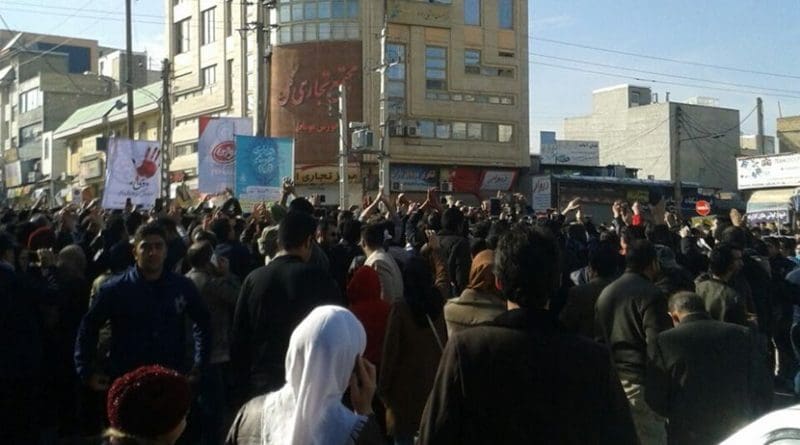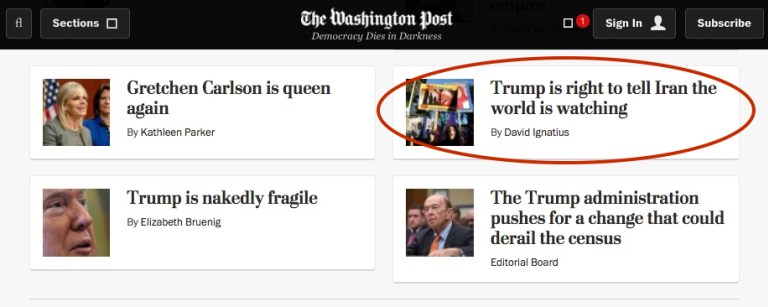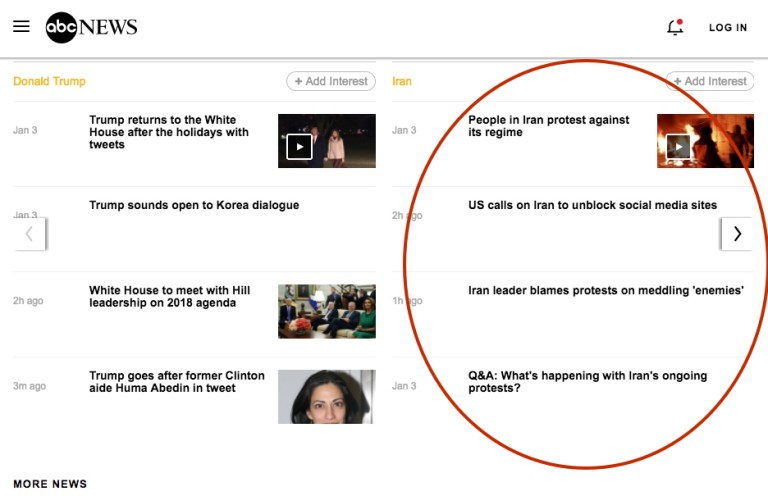The Iran Protests And American Journalistic Hackery – OpEd
By Mitchell Blatt*
Before New Year’s and continuing until the present, Iranians have taken to the streets to demand political and economic reforms. Over 400 protesters have been reportedly arrested and 20 killed. Having cracked down violently on protests in 2009, too, the Iranian government appears to face a crisis of legitimacy.
Much of the commentary from the political right, however, launders the protesters’ real grievances to make partisan political points. Take Fox News opinion columnist Stephen L. Miller (@RedSteeze on Twitter). Yesterday evening (US time), he had published a garden variety “Why aren’t liberal feminists supporting Muslim women in the Middle East?” article.
In this case, the specific language was: “Women are leading in Iran. Where is their voice of support from the left?”
So the question must be asked: Where are the women’s movement supporters in the United States and Europe, which gathered en masse to protest a newly inaugurated American president last year?
The question presumes that a protest in America against Iran’s government would have much influence in toppling Iran’s government. It presumes Americans shouldn’t care about the actions of their own government–or at least shouldn’t care any more about their own government’s actions than they do about those of foreign governments. After all, why should Americans protest bad governance and abuses of power in America if they don’t protest about foreign countries?
The question could be asked about anything. Why hasn’t Stephen L. Miller written anything about North Korea’s human rights abuses lately? Why hasn’t he written about democratic backsliding in Poland and Hungary governments?
Hell, Miller was outraged about the IRS reportedly scrutinizing tax exemption applications from Tea Party groups. Even if a conspiracy against the Tea Party existed (and it didn’t–liberal groups applying for tax exempt status were scrutinized, too, according to an audit conducted years later), would it really be as bad as South African leader Jacob Zuma’s hundreds of crimes of corruption?
One can imagine the story framed in Miller’s terms:
So the question must be asked: Where are the conservatives and Tea Partiers in the United States, which gathered en masse to protest a newly inaugurated American president on Tax Day?
Another cliché gaining being pushed on Iran is the typical: “Why isn’t the media covering this story that I read about in the media?” Stephen Miller wrote on December 30:
The question that needs to be asked right now is why traditional mainstream media outlets – grandstanding over their importance in this new, bold era of fact-checking and truth-telling – have largely ignored a blossoming revolution.
Funnily enough, Tablet Magazine published Lee Smith’s article that very same day: “Why Can’t the American Media Cover the Protests in Iran?”
Clearly stories about the United States are more relevant to Americans than stories about foreign countries, and stories about Europe, China, Russia, or other world powers are also reported on more because those countries exert more influence on the US and the world. The concern over Iran being purportedly ignored is the conservative inverse of what is heard from the left when a terrorist attack in Europe gets more attention from the “corporate media” (Project Censored) than “at least 12 other terrorist attacks that week” (Huffington Post).
Yet the fact that we are talking and writing about the Iran protests, with coverage and commentary in outlets across the internet, from Slate to Politico to Fox News to Tablet to National Review to Commentary to the AP to the New York Times would seem to contradict the premise.
Stephen L. Miller, who may never have even visited Iran, wouldn’t even know credible facts about the protests without the media’s reporting on it (neither have I, and I wouldn’t presume to know exactly what’s happening on the ground in Iran and what its society thinks). Sure, one can hear of a protest on Twitter, but the news, videos, and factual claims made by people who are often activists are not easily verifiable. Reports by the professional journalists in a chaotic time in a democracy, let alone a closed country, are far from perfect, too, but they are our best source of information.
Despite a near blackout, these protests are not intended for domestic Iranian audiences only.
Lee Smith is a heavily partisan neo-conservative who strongly opposed Obama’s Iran deal.
His grievance with the media is that not everyone who reports on the protests holds the exact same view as him.
What Iranians are really upset about, the messaging goes, isn’t the daily grind of living in a repressive theocratic police state run by a criminal elite that robs them blind, but a normal human desire for better living standards.
Imagine humans desiring better living standards. Who would want such a thing? In point of fact, economic-related grievances are cause for many protests–and there isn’t anything at all wrong with taking to the streets to protest for just that reason. Most people want to live better, and when people demand the airy ideal of “democracy,” what they usually mean is having more control in their own lives and ability to strive.
Lee should read some Ronald Inglehart (Modernization and Postmodernization) and or Daron Acemoglu and James A. Robinson’s 2012 work Why Nations Fail: The Origins of Power, Prosperity, and Poverty to learn about how interrelated democratic institutions and economic development can be. If the middle class is growing, they will be more likely to want democracy, and an open and pluralistic society that offers incentives for beneficial economic behavior is important for growth. In short, democratic-style reforms (broadly speaking) will be likely necessary in Iran in order for it to pursue economic development, and that development, too, will likely spur further demands.
All the same, the protesters risking their lives and liberty against the regime’s armed enforcers may not very well not represent the majority of Iranians. Not everyone in the world supports Western-style democracy, and it would be a mistake to suppose they do without preparing for the disappointment that often follows regime-change.
Typically, the hyperbolic faction within neo-conservatives, represented by Lee, misjudges and exaggerates about those they disagree with. Obama is not merely liberal. In Lee’s mind, he’s “anti-Semitic.” The Obama administration wasn’t trying to limit Iran’s nuclear development, not even to balance against the Saudis, but rather to “ditch Israel” and “embrace Iran.”
Hence the real reason there is so much flak coming out from conservatives on Iran. The theocratic Iranian regime is just collateral damage in their war with the Democrats.
*Mitchell Blatt has been based in China and Korea since 2012. A writer and journalist, he is the lead author of Panda Guides Hong Kong guidebook and has contributed to outlets including The National Interest, National Review Online, Acculturated, and Vagabond Journey. Fluent in Chinese, he has lived and traveled in Asia for three years, blogging about his travels at ChinaTravelWriter.com. You can follow him on Twitter at @MitchBlatt.
This article was published at Bombs and Dollars.






Neocon regime change.Yet again.